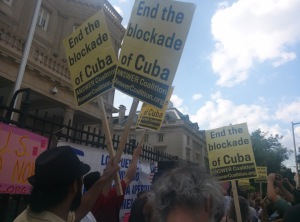Originally published in Liberation Newspaper, August 2015
Marking the end of a diplomatic deep freeze that began in 1961, Cuba and the United States have restored relations and reopened embassies in their respective capitals.
On July 1, Cuban president Raul Castro Ruz and President Obama exchanged letters in which they confirmed the decision to re-establish diplomatic relations. At the ceremony reopening Cuba’s embassy in Washington, D.C., Foreign Minister Bruno Rodríguez Parrilla attributed the diplomatic breakthrough to the “free and unshakable will, unity, sacrifice, selflessness, heroic resistance and work of our people and also the strength of the Cuban Nation … Several generations of the revolutionary diplomacy have converged in this effort and offered their martyrs.”
While working towards normalizing bilateral ties with the U.S. government, Cuba also demands the reversal of policies that negatively affect the Cuban people, asserting that only then can there truly be normal relations. Among these are the blockade, the occupation of Guantánamo Bay, and all U.S.-backed programs and efforts that foster destabilization and subversion. The economic blockade hurts the Cuban people because it creates scarcities and hinders the development of the Cuban economy, causing more than $1.2 trillion in damages since 1962. Cuba has remained resilient for over five decades in defending its revolution and constructing socialism. Reopening diplomatic ties creates opportunities for the continued development of socialism on the island.
Cuba’s global prestige, due in large part to its medical internationalism that includes combating HIV transmission and fighting the Ebola epidemic in West Africa, has increased the pressure on U.S. imperialism to negotiate with Cuba. This most recent diplomatic restoration is part of a larger deal that includes concessions from the United States including the release of the Cuban Five and the removal of Cuba from the U.S.-engineered list of state sponsors of terrorism.
As revolutionaries and staunch defenders of the Cuban Revolution, the Party for Socialism and Liberation views the shift toward diplomatic relations on the part of the United States as a new approach to regain lost power in Latin America. The strategy of isolating and economically strangling Cuba did not succeed. A considerable section of the U.S. ruling class, including the Obama administration, hopes that a different course will be more effective at destabilizing and overthrowing socialism in Cuba.
The administration argues that opening up diplomatic ties is an opportunity to create “positive change” on the island. That veiled language translates to at least $30 million dollars spent by Washington for fiscal year 2016 to finance a tiny right-wing opposition in the island and its larger counterpart in Miami.
Based on past experience in Syria, Libya and Iraq, we know that “spreading democracy” and creating “positive change” is code for different forms of intervention aimed at weakening sovereign anti-imperialist states. The revolutionary Cuban government of course recognizes the embassy opening as a victory that presents opportunity for the Cuban people. In agreeing to restore diplomatic relations, the Cuban government has fiercely defended Cuba’s sovereignty without interference. It has continued to defend Cuba’s socialist health care and education system, continued the proud traditions of internationalism in the fields of health and science and maintained resolute support for revolutionary exiles like Assata Shakur.
We stand with the Cuban government and defend the revolution and the construction of socialism in Cuba.






